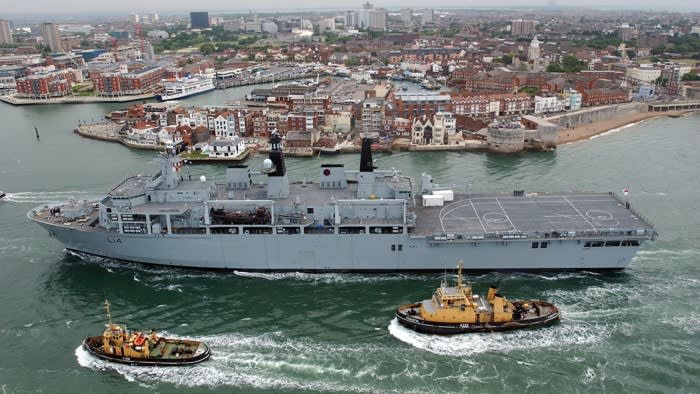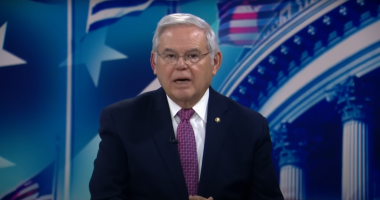
Stay informed with free updates
Simply sign up to the Aerospace & Defence myFT Digest — delivered directly to your inbox.
Rishi Sunak is preparing to announce a new warship programme, as he comes under pressure from Conservative MPs to make a manifesto pledge to increase defence spending 2.5 per cent of GDP by a specific date.
The UK prime minister is expected to press ahead next month with plans for new multi-role support ships, which will help underpin Britain’s ability to conduct amphibious warfare, according to people familiar with the matter.
The national shipbuilding strategy, last updated two years ago, sketched out plans for a single class of multi-role support ship (MRSS) to enter service in the early 2030s that would replace the current amphibious fleet, which consists of a mix of warship and auxiliaries including the Royal Navy’s landing platform docks, HMS Albion and HMS Bulwark.
Officials cautioned that the government is yet to sign off on new funding for the announcement. It is not yet clear how the procurement will be structured and whether it will be put out to competition among Britain’s shipbuilders. Warships are currently always built in the UK. The new programme would likely be split into two batches of three ships, according to the people.
The expected announcement comes as Conservative MPs mount a fresh campaign to compel Sunak to commit to higher defence spending.
The prime minister has said he will increase defence spending to 2.5 per cent of national income “when economic conditions allow”, an aspiration matched last week by Sir Keir Starmer.
The Labour leader has been at pains to build the party’s reputation on defence following the Jeremy Corbyn era, when Labour’s commitment to the nuclear deterrent and Nato were called into question. Recent polling suggests Labour is now more trusted by the British public on defence than the Tories.
Sir Simon Clarke, a former cabinet minister on the right of the Tory party, said: “In a dangerous world, we need to set out with greater conviction and clarity how we’d get to 2.5 per cent of GDP on defence in the next parliament.”
He said that while traditionally the Conservatives had been the party of defence, “we’re straining credulity on this question at the moment”.
Downing Street has kicked off a series of policy committees with Tory MPs to discuss potential manifesto commitments, with sessions spanning public services, communities, security, the economy and the environment.
Tory MPs told the Financial Times that defence has become a flashpoint, alongside the party’s policy on the European Convention on Human Rights and demands for tax cuts.
Some MPs believe the prime minister may unveil a one-off uplift to defence spending around the time of a Washington summit to mark the 75th anniversary of Nato in July, which they think could total as much as £500mn. But they are urging him to go further.
Former defence secretary Ben Wallace said: “There’s no substitute for a core funding increase that leads towards 3 per cent in 2030 and 2.5 per cent as soon as possible. No 10 needs to put a date on it.”
Nonetheless, an announcement by Sunak about new multi-role support ships would be welcomed by his backbenchers as a signal the party is willing to boost the defence ministry’s capital budget.
Procurement minister James Cartlidge said in February that the warship programme was currently in a “pre-concept phase”. Work has been under way to determine the requirements of the vessels and ensure their affordability, he said.
The Ministry of Defence said the MRSS programme is “being considered under the new Integrated Procurement Model”, the department’s recently launched attempt to reform its procurement system.
“In line with the principles of the new model, we are continuing to assess all available in options in detail at this early stage,” the MoD added.
Defence experts, however, questioned how the government could fund a new programme given the severe constraints on the defence ministry’s equipment budget. The National Audit Office said last year that the MoD’s equipment plan was facing its largest budget black hole in more than a decade.
“Show us the money and show us which shipyards will build these,” said Francis Tusa, editor of the Defence Analysis newsletter, noting that there was little spare capacity at Britain’s large shipyards.
A programme of six ships, Tusa estimated, would cost a minimum of £1.8bn but likely more than £2bn if sophisticated sensors and other equipment was added on.
He noted that though the UK last year signed a memorandum of understanding with the Netherlands to collaborate on common design options for new amphibious vessels, the Dutch recently announced they were proceeding with their own programme.
Additional reporting by Nic Fildes
Read More: World News | Entertainment News | Celeb News
FT









